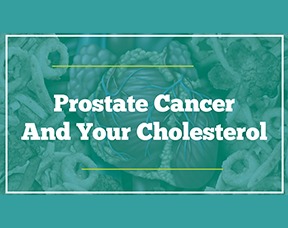Urologists have known for a long time that prostate cancer and high blood cholesterol levels are linked, but what we did not know is how or why.
Does the onset of prostate cancer goose cholesterol levels, or vice versa? It’s more than just another chicken-and-egg question, because cholesterol is fed upon by tumors, and it helps them to grow.
New research out of Duke University is at last shedding some light on this link. With that comes some insight that may lead to improved survival for prostate cancer sufferers.
“Prostate cancer cells somehow bypass the cellular control switch that regulates the levels of cholesterol allowing them to accumulate this fat,” said senior author Donald McDonnell, PhD, chairman of the Department of Pharmacology and Cancer Biology at Duke.
The researchers identified the genes involved in cholesterol regulation in prostate tumors. Next they focused upon one particular gene that they had determined is the key component of the mechanisms that determine the level of cholesterol within cells.
The expression of this gene, they saw, is significantly lower in patients with prostate cancer. In fact, the more aggressive a man’s cancer was shown to be, the lower the expression of the gene proved to be.
Proteins called receptors bind to cells and allow them to receive any number of messages and cues from the rest of the body. The more receptors on a cell tuned to the same message, the more the cell will respond to it.
The team from Duke found that down regulation of the “cholesterol gene” basically shuts off the sensor that cells use to gauge when they have taken up enough of that fat.
In that state it allows accumulation of cholesterol in tumor cells, which in turn gives prostate cancer cells a ready trough from which to feed.
“It remains to be determined how this regulatory activity can be restored and/or whether it’s possible to mitigate the effects of the increased cholesterol uptake that result from the loss of [the cell’s] expression,” McDonnell said.


